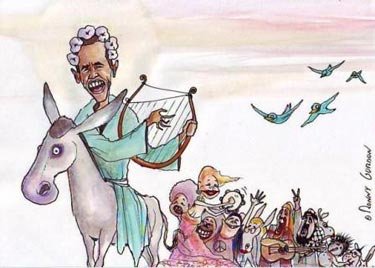Pseudolus, Not Oedipus
Barack Obama, Classical Theater, Libya, Plautus, Sophocles, Victor Davis Hanson

Victor Davis Hanson, in characteristic fashion, draws upon Classical metaphors to editorialize upon Barack Obama and Benghazi.
The Libyan plot is Sophoclean to the core: the heroism of outnumbered Americans who chose to confront a deadly enemy, and were killed and wounded in the defense of their endangered comrades — while the world’s greatest military hesitated to use its power against a ragtag militia to save them. Bureaucrats ignored not only pleas for beefed-up security before the attack, but also more requests that followed during the assault for reinforcement. A concocted story about a culpable obscure video gave opportunity for the administration to brag about their cosmopolitan multiculturalism as they damned the unhinged filmmaker and, in doing so, systemically lied about the real terrorist culprits of the killings.
The strange thing about Libya is not so much who lied, but rather the question of whether anyone has yet told the whole truth. When American diplomatic personnel are murdered abroad, an administration usually is vehement in blaming likely suspects; I cannot remember a single incident, however, when our government ignored those most likely responsible to focus on others least likely to be culpable. Once the election is over, and reporters no longer feel any remorse about hurting the reelection chances of Barack Obama, perhaps some of their usual incentives to crack open a cover-up will reassert themselves.
In Sophoclean terms, hubris (arrogance) — often due to a character flaw (amartia) — leads to atê (excess and self-destructive recklessness) that in turn earns nemesis (divine retribution). In that tragic sense, an overweening Obama must have known that — despite the Drone killings — al-Qaeda was far from impotent. And it was not wise, as Obama once himself warned, to high-five the bin Laden raid and leak to the world the details — knowing as he did that bin Laden’s death was not his trophy alone (or indeed a trophy at all) — but better left an unspoken collective effort of military bravery and the dividend of the often derided Bush-Cheney anti-terrorism protocols that Obama had both damned and then embraced. Ironically (another good Greek word), it was probably not so much an obscure video, but the constant chest-thumping about the grisly end of Osama that infuriated the al-Qaeda affiliates. Nothing, after all, is quite so dangerous as talking loudly while carrying a small stick.
Excuse me if I disagree with the learned Professor Hanson on this one.
The heroic death of former Navy SEALs, Glenn Doherty and Tyrone Woods, fighting to the last against overwhelming odds, possibly in defiance of instructions to the contrary by higher authorities, which then declined to come to their aid, did strike an echo from the classics, but it reminded us of Greek history, of Leonidas and the Spartans at Thermopylae, of Xenophon’s Greek soldiers who volunteered for “forlorn hope” assignments to make possible the march of the rest of the 10,000 up country and out of enemy territory to the sea, or (as in Macauley’s poem) Horatius Cocles:
Then out spoke brave Horatius, the Captain of the Gate:
“To every man upon this earth, death cometh soon or late;
And how can man die better than facing fearful odds,
For the ashes of his fathers, and the temples of his Gods?”
But Obama is not Sophoclean in the least, and the Obama Administration’s mishandling of the situation in Benghazi and their subsequent misstatements, evasions, and attempts at a cover-up, in my eyes at least, fail to rise to the moral level of the Greek tragedies.
Obama is not Oedipus, a mythic hero doomed to disaster from a point even before his birth by prophetic fate. Obama is no figure out of Sophoclean tragedy. What he really is is a stereotype figure familiar from Roman comedy: Obama is actually Plautus’s clever (and totally immoral) slave Pseudolus (familiar to most readers from Stephen Sondheim’s 1962 musical adaptation A Funny Thing Happened on the Way to the Forum).
Like Pseudolus, Obama is a trickster-hero who easily bamboozles the pompous and self-important with an innate cunning superior to their own and a glorious gift of gab, and who makes a success of posing in the role of a person of far superior station to his own.
In the Roman theater, or on the Broadway stage, the tricky slave getting above himself and (for a time, at least) pulling off the role makes for excellent humor and entertainment, but when serious decisions are required and lives are at stake, the unprincipled trickster-hero is not the ideal personality type to have in charge.
Barack Obama appears to have been principally concerned, during the seven hours of unequal combat in Benghazi, with avoiding an international incident featuring the US violation of Libyan sovereignty, possibly also provoking more Islamic wrath, and spoiling his own triumphant narrative of successfully leading a series of “Arab Spring” democratic revolutions from behind. Besides, he needed to run off to a campaign fund-raiser in Las Vegas.
When events concluded worse and in a far more dramatic fashion than he had hoped, President Pseudolus reverted to type, doing everything he could to talk his way out of the mess.
The tragic hero will be killed, or at least blinded and exiled in atonement. The comic rascal, on the other hand, will merely dazzle the audience with ever greater shifts, lies, and inventions.
Obama, of course, has one major advantage that the clever slave of Antique Comedy lacked, the chorus (in our case, the mainstream media) is thoroughly on his side, and will do everything possible to help him get away with everything.



